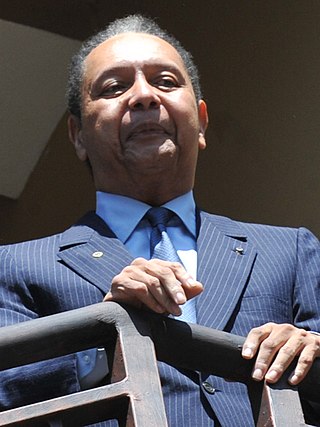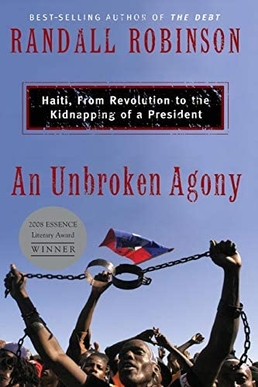
Jean-Bertrand Aristide is a Haitian former Salesian priest and politician who became Haiti's first democratically elected president. As a priest, he taught liberation theology and, as a president, he attempted to normalize Afro-Creole culture, including Vodou religion, in Haiti. Aristide was appointed to a parish in Port-au-Prince in 1982 after completing his studies to become a priest. He became a focal point for the pro-democracy movement, first under Jean-Claude "Baby Doc" Duvalier and then under the military transition regime which followed. He won the 1990–91 Haitian general election with 67% of the vote.

Jean-Claude Duvalier, nicknamed "Baby Doc", was a Haitian politician who was the President of Haiti from 1971 until he was overthrown by a popular uprising in February 1986. He succeeded his father François "Papa Doc" Duvalier as the ruler of Haiti after his death in 1971. After assuming power, he introduced cosmetic changes to his father's regime and delegated much authority to his advisors. Thousands of Haitians were killed or tortured, and hundreds of thousands fled the country during his presidency. He maintained a notoriously lavish lifestyle while poverty among his people remained the most widespread of any country in the Western Hemisphere.
Louis-Jodel Chamblain is a prominent Haitian military figure who has led both government troops and rebels.

Matthieu Prosper Avril is a Haitian political figure who was President of Haiti from 1988 to 1990. A trusted member of François Duvalier's Presidential Guard and adviser to Jean-Claude Duvalier, Lt. Gen. Avril led the September 1988 Haitian coup d'état against a transition military government installed after Jean-Claude Duvalier's 1986 overthrow. He was President until March 1990, in a period which according to Amnesty International was "marred by serious human rights violations". He was arrested in 2001, but released in March 2004 after the 2004 Haitian coup d'état overthrew Jean-Bertrand Aristide.
Gérard Jean-Juste was a Haitian Roman Catholic priest and rector of Saint Claire's church for the poor in Port-au-Prince, Haiti. He was also a liberation theologian and a supporter of the Fanmi Lavalas political party, as well as heading the Miami, Florida-based Haitian Refugee Center from 1977 to 1990.
Jean-Claude Bajeux was a Haitian political activist and professor of Caribbean literature. For many years he was director of the Ecumenical Center for Human Rights based in Haiti's capital, Port-au-Prince, and a leader of the National Congress of Democratic Movements, a moderate socialist political party also known as KONAKOM. He was Minister of Culture during Jean-Bertrand Aristide's first term as President of Haiti.

Ertha Pascal-Trouillot is a Haitian politician who served as the provisional President of Haiti for 11 months in 1990 and 1991. She was the first woman in Haitian history to hold that office and the first female president of African descent in the Americas.

Haitian Americans are a group of Americans of full or partial Haitian origin or descent. The largest proportion of Haitians in the United States live in Little Haiti to the South Florida area. In addition, they have settled in major Northeast cities such as New York City, Boston, Philadelphia, Baltimore and Washington, D.C., and in Chicago and Detroit in the Midwest. Most are immigrants or their descendants from the mid-late 20th-century migrations to the United States. Haitian Americans represent the largest group within the Haitian diaspora.

Haiti's Constitution and written laws meet most international human rights standards. In practice, many provisions are not respected. The government's human rights record is poor. Political killings, kidnapping, torture, and unlawful incarceration are common unofficial practices, especially during periods of coups or attempted coups.

Félix Morisseau-Leroy was a Haitian writer who used Haitian Creole to write poetry and plays, the first significant writer to do so. By 1961 he succeeded in having Creole recognized as an official language of Haiti, after expanding its teaching in schools and use in creative literature. Morisseau also published works on French, Haitian Creole and Haitian French literature. He worked internationally, encouraging the development of national literature in post-colonial Ghana and Senegal. In 1981 he settled in Miami, Florida, where he was influential in uniting the Haitian community around Creole and encouraged its study in academia.

The American Immigration Lawyers Association (AILA), founded on October 14, 1946, is a voluntary bar association of over 15,000 attorneys and law professors who practice and teach immigration law. AILA member attorneys represent U.S. families seeking permanent residence for close family members, as well as U.S. businesses seeking talent from the global marketplace. AILA members also represent foreign students, entertainers, athletes, and asylum seekers, sometimes on a pro bono basis. AILA is a nonpartisan, not-for-profit organization that provides continuing legal education, information, professional services, and expertise through its 38 chapters and over 50 national committees. Its national headquarters are in Washington, D.C.

An Unbroken Agony: Haiti, From Revolution to the Kidnapping of a President is a book on the history of Haiti by Randall Robinson in 2008.
Zadvydas v. Davis, 533 U.S. 678 (2001), was a case decided by the Supreme Court of the United States. The court ruled that the plenary power doctrine does not authorize the indefinite detention of immigrants under order of deportation whom no other country will accept. To justify detention of immigrants for a period longer than six months, the government was required to show removal in the foreseeable future or special circumstances.

The 1991 Haitian coup d'état took place on 29 September 1991, when President Jean-Bertrand Aristide, elected eight months earlier in the 1990–91 Haitian general election, was deposed by the Armed Forces of Haiti. Haitian military officers, primarily Army General Raoul Cédras, Army Chief of Staff Philippe Biamby and Chief of the National Police, Michel François led the coup. Aristide was sent into exile, his life only saved by the intervention of U.S., French, and Venezuelan diplomats. Aristide would later return to power in 1994.
Leslie Delatour (1950–2001) was a Haitian economist who served as governor of the Bank of the Republic of Haiti from 1994 to 1998, and as Haiti's Minister of Finance from 1986 to 1988.
Aristide and the Endless Revolution is a 2005 feature documentary directed and produced by Nicolas Rossier about former Haitian President Jean-Bertrand Aristide and the coup d'etat that ousted him from the country in 2004. Rossier was the first media professional to get exclusive access to Aristide while in exile and the resultant interview is featured in the film, as well as interviews with many experts on Haiti, including U.S. Representative Maxine Waters, noted economist Jeffrey Sachs and Aristide's lawyer Ira J. Kurzban.

The Haitian refugee crisis, which began in 1991, saw the US Coast Guard collect Haitian refugees and take them to a refugee camp at Guantanamo Bay. They were fleeing by boat after Jean-Bertrand Aristide, the democratically elected president of Haiti, was overthrown and the military government was persecuting his followers. The first camp reached a maximum of 12,500 people. It was then reduced to 270 refugees who either had HIV or were related to someone who did. The reduction was the result of the US policy adopting a strict policy of repatriation for both those found at sea and most of those living in Guantanamo. The HIV+ refugees were quarantined in a section of the military base known as Camp Bulkeley and faced human rights violations. They were brought to the United States after US District Judge Sterling Johnson Jr. ruled the camp was an "HIV prison camp."
Antoine Adrien was a Catholic Priest and liberation theology advocate who served as Father Superior of the Holy Ghost Order in Haiti. He also served as Director of the "Petit Séminaire Collège Saint-Martial", attended primarily by children of the country's elite. Adrien was expelled from Haiti in 1969 by the Francois Duvalier regime which accused the Holy Ghost Order of harboring communists working to overthrow the regime.

Boika v. Holder, 727 F.3d 735, is a precedent decision by the United States Court of Appeals for the Seventh Circuit addressing an alien's motion to reopen after the Board of Immigration Appeals (BIA) had denied her applications for asylum, withholding of removal, and for relief under the convention against torture. Judge David F. Hamilton wrote the opinion for the three-judge panel which granted the petition for review and remanded the case to the BIA for further proceedings.
Wolf v. Vidal, 591 U.S. ___ (2020), was a case that was filed to challenge the Trump Administration's rescission of Deferred Action for Childhood Arrivals (DACA). Plaintiffs in the case are DACA recipients who argue that the rescission decision is unlawful under the Administrative Procedure Act and the Fifth Amendment. On February 13, 2018, Judge Garaufis in the Eastern District of New York addressed the question of whether the government offered a legally adequate reason for ending the DACA program. The court found that Defendants did not provide a legally adequate reason for ending the DACA program and that the decision to end DACA was arbitrary and capricious. Defendants have appealed the decision to the Second Circuit Court of Appeals.












